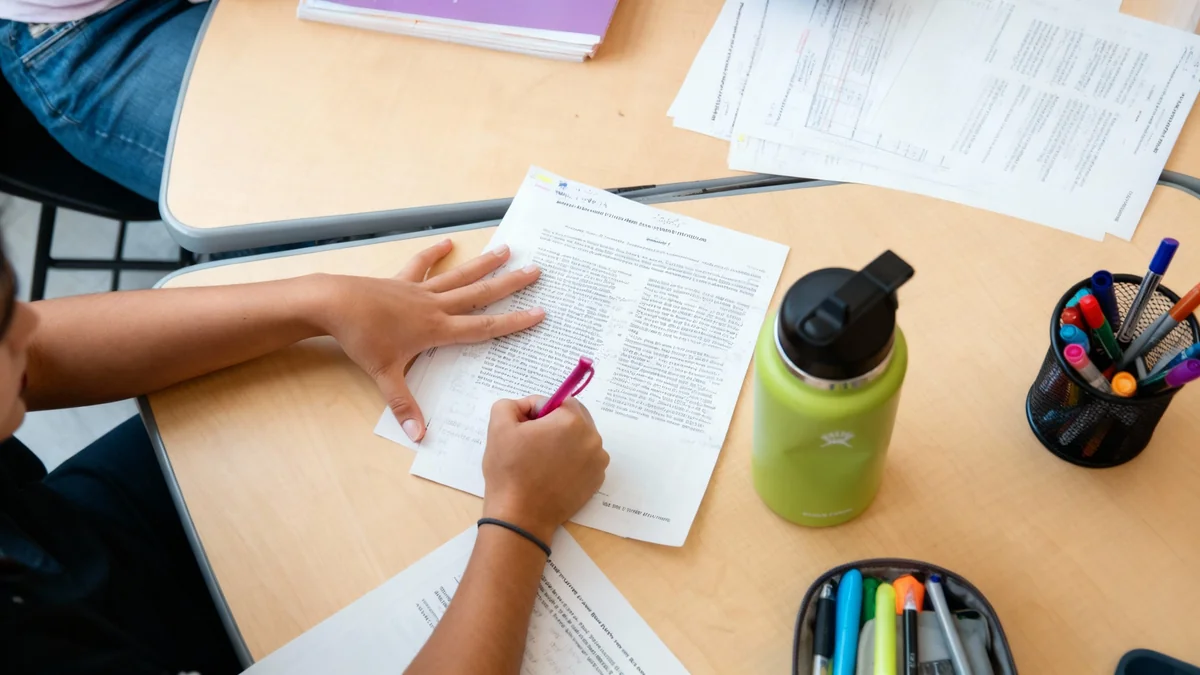Recent national test results reveal a significant decline in the academic abilities of American high school students, with reading skills for 12th graders falling to their lowest point in three decades. The data, considered the nation's most reliable measure of student achievement, indicates a deepening educational crisis with far-reaching implications for the future workforce and civic engagement.
The findings from the National Assessment of Educational Progress (NAEP) show that approximately one-third of high school seniors tested last year did not possess basic reading proficiency. This trend is mirrored in mathematics, where scores have dropped to levels not seen since 2005, painting a stark picture of the challenges facing the U.S. education system.
Key Takeaways
- Reading scores for 12th graders are the worst they have been in 30 years.
- About one-third of seniors tested below the basic reading proficiency level.
- Mathematics scores for 12th graders have fallen to their lowest point since 2005.
- Experts point to pandemic disruptions, increased screen time, and policy shifts as potential causes for the decline.
- The skill deficit could impact students' ability to analyze complex information and succeed in the job market.
A Generational Setback in Education
The latest results from the NAEP, often called the "Nation's Report Card," provide the first comprehensive look at the academic performance of high school seniors since the beginning of the COVID-19 pandemic. The students tested were in the 8th grade when schools nationwide shifted to remote learning in March 2020, an event that profoundly disrupted their educational journey.
While the pandemic is a significant factor, experts note that the decline in student performance, particularly among those already struggling, began several years before 2020. This suggests that deeper, more systemic issues are contributing to the problem.
By the Numbers
- 33% of 12th graders scored below the basic level in reading.
- Nearly 50% of 12th graders scored below the basic level in mathematics.
- The decline in math scores represents the lowest performance recorded since 2005.
The Multifaceted Causes of Decline
Educators and researchers are examining a combination of factors to understand this worrying trend. The disruptions caused by the pandemic, including school closures, inconsistent remote learning, and student and teacher illness, are widely seen as primary contributors. Millions of teenagers spent a critical year or more of their high school experience learning through a screen, which impacted engagement and knowledge retention.
Beyond the pandemic, a major cultural shift is also under scrutiny: the dramatic increase in screen time. Over the past decade, both children and adults have increasingly replaced reading books and other long-form texts with time spent on social media, streaming video, and other digital entertainment. This shift away from sustained reading is believed to have a direct impact on comprehension and critical thinking skills.
Another potential factor is a relaxation of accountability measures in education. Over the same period, federal and state governments have eased some policies designed to hold schools and educators accountable for student learning outcomes, which may have inadvertently contributed to the slide in performance.
The Real-World Consequences of Low Proficiency
The implications of this decline extend far beyond the classroom. A lack of basic reading proficiency can severely limit a young person's ability to navigate the modern world. For instance, students who score below the basic level may struggle to understand the main purpose of a political speech, critically evaluate sources of information online, or comprehend complex instructions in a workplace.
What Does 'Basic Proficiency' Mean?
According to the NAEP framework, students performing at the 'basic' level demonstrate partial mastery of the prerequisite knowledge and skills fundamental for proficient work at their grade level. Scoring 'below basic' indicates that a student has not reached this foundational milestone, which can include skills like identifying the main idea of a passage or using context clues to understand vocabulary.
This skills gap presents a significant challenge for the future of the American workforce. Employers may find it increasingly difficult to hire skilled workers capable of solving real-world problems, such as using percentages to calculate a discount or interpreting technical manuals. This could slow economic growth and innovation.
"With increased screen time it seemed inevitable that fewer people would engage with lengthy texts in the future, and that we might need to rethink how education is delivered," said D. Graham Burnett, a historian of science at Princeton University, highlighting the need for educational systems to adapt to changing habits.
Searching for Solutions in a New Era
Addressing this decline requires a multi-pronged approach from educators, policymakers, and families. The challenge is not just to recover from the learning loss associated with the pandemic but also to adapt educational strategies for a generation of digital natives.
Some experts suggest that schools should not abandon traditional reading but find new ways to integrate it with modern learning tools. Others propose a renewed focus on foundational skills that have been overshadowed by technology, such as public speaking, debate, memorization, and performance. These skills build comprehension and analytical abilities in different but equally important ways.
Potential Paths Forward
Possible interventions being discussed by education leaders include:
- Intensive Tutoring Programs: Targeted, high-dosage tutoring has shown promise in helping students catch up on lost learning.
- Curriculum Reform: A renewed emphasis on foundational literacy and numeracy skills from an early age.
- Media Literacy Education: Teaching students how to critically analyze and evaluate the vast amount of information they encounter on screens daily.
- Re-evaluating Accountability: Reinstating or redesigning policies that hold educational institutions accountable for student progress.
The urgency of the situation is clear. As today's high school seniors prepare to enter college, trade schools, or the workforce, they face an information landscape more complex than ever before. Ensuring they have the fundamental skills to succeed is not just a personal challenge but a societal imperative.





